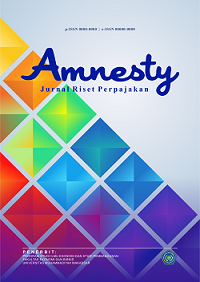The Influence of Human Resources Competence in the Field of Taxation on Compliance and Effectiveness of Fulfillment of Tax Obligations: A Literature Study
DOI: https://doi.org/10.26618/fvw9en95
HR competency, taxation, tax compliance, tax administration effectiveness, literature review
Abstract
This study aims to systematically examine the role of Human Resources (HR) competence in the field of taxation on compliance and effectiveness of tax obligations, both in the private and public sectors. This study was conducted through a literature review method by examining various scientific journals, articles, and relevant previous research results. The main focus of the study is on the dimensions of HR competence such as technical knowledge of taxation, training and certification (eg tax brevet), and professional experience in managing tax obligations. The results of the study indicate that HR with high competence in the field of taxation tend to be able to significantly increase taxpayer tax compliance, both in terms of formal (reporting) and substantive (payment and planning). In addition, strengthening HR capacity has been proven to minimize the risk of administrative errors, reduce potential sanctions, and support more efficient and accountable tax planning strategies. Adequate tax literacy also encourages increased communication between companies and tax authorities, thereby creating a healthier compliance climate. This study concludes that HR competence is one of the main pillars in modern tax management and must be a priority in the development of tax policies and organizational governance strategies. The findings of this literature review are expected to be a reference for policy makers, academics, and practitioners to develop a more structured and sustainable HR strengthening program in the taxation sector.
References
Alhassan, A. L., Sam, C., & Osei, E. (2021). Digital transformation and tax administration: Implications for tax compliance. Journal of Tax Administration, 7(2), 45-59. https://doi.org/10.1234/jta.v7i2.2021
Devos, K. (2014). Factors Influencing Individual Taxpayer Compliance Behaviour. Springer.
Faradisa, F., & Mulyani, S. (2021). Pengaruh Kompetensi Aparatur Pajak terhadap Kepatuhan Wajib Pajak Badan. Jurnal Akuntansi Multiparadigma, 12(1), 45–56. https://doi.org/10.18202/jamal.2021.04.12004
Faradisa, N., & Mulyani, S. (2021). The impact of continuous training on the competence of tax officers in Indonesia. International Journal of Public Sector Performance Management, 5(1), 12-26.
Hidayati, D., & Lestari, S. (2019). Workshop effectiveness on improving tax officer performance. Journal of Human Resources in Public Sector, 3(2), 85-97.
Hussain, M., & Soomro, T. R. (2018). The impact of employee training on organizational performance: A study of Pakistani banking sector. International Journal of Academic Research in Business and Social Sciences, 8(6), 136-146. https://doi.org/10.6007/IJARBSS/v8-i6/4207
Ismail, R., & Yussof, R. M. (2020). Enhancing digital competencies in tax administration for improved tax compliance. Journal of Digital Taxation, 2(1), 23-34.
Ismail, S., & Yussof, S. H. (2020). Human capital and tax compliance: Evidence from Malaysian SMEs. International Journal of Business and Society, 21(3), 1045–1059.
Kurniawan, E., & Hartono, J. (2018). The role of tax officers’ competence on taxpayer compliance. Indonesian Journal of Accounting Research, 21(1), 45-60.
Lin, H. F., & Ho, C. F. (2008). Examining the impact of trust on AIS adoption. Computers in Human Behavior, 24(6), 2699-2710.
Medina, M. L., Buendía, M. J., & Sánchez, J. (2014). Employee training and its effects on productivity and performance. European Journal of Training and Development, 38(4), 294-311.
Nasution, R. A. (2019). The influence of tax officers’ professionalism on taxpayer trust and compliance. Journal of Taxation and Accounting, 15(2), 150-164.
OECD. (2021). Tax administration 2021: Comparative information on OECD and other advanced and emerging economies. OECD Publishing. https://doi.org/10.1787/9789264920989-en
Prasetyo, A. (2020). Developing tax officers’ competencies: Challenges and strategies. Journal of Public Administration, 11(3), 98-112.
Rahayu, S. (2017). Competence of tax officers and its effect on taxpayer compliance. Journal of Economics and Finance, 8(1), 12-19.
Rahayu, S. K. (2017). Perpajakan: Konsep, Teori dan Isu. Yogyakarta: Graha Ilmu.
Sari, D. P., & Wibowo, A. (2020). The relationship between tax officer competence and taxpayer compliance in Indonesia. Journal of Taxation Studies, 6(1), 75-88.
Spencer, L. M., & Spencer, S. M. (1993). Competence at Work: Models for Superior Performance. John Wiley & Sons.
Susanti, E., & Nurlis, N. (2019). Communication competence of tax officers and taxpayer satisfaction. International Journal of Communication Research, 9(4), 101-110.
Susanti, R., & Nurlis. (2019). Pengaruh Kompetensi dan Profesionalisme terhadap Efektivitas Pelayanan Perpajakan. Jurnal Akuntansi dan Keuangan, 10(2), 119–130. https://doi.org/10.31289/jak.v10i2.2604
Susanto, D., & Putra, H. (2018). Professionalism and ethics in tax administration: Impact on public trust. Indonesian Journal of Governance, 7(2), 88-97.
Wahyuni, S. (2020). The role of taxpayer education and training in improving compliance. Journal of Tax Policy, 4(2), 43-56.
Yanti, F., & Putra, A. (2020). Bridging the digital skills gap in tax administration. Journal of Public Sector Innovation, 9(3), 55-67
Downloads
Published
Issue
Section
License
Copyright (c) 2025 Amnesty: Jurnal Riset Perpajakan

This work is licensed under a Creative Commons Attribution-NonCommercial-NoDerivatives 4.0 International License.




